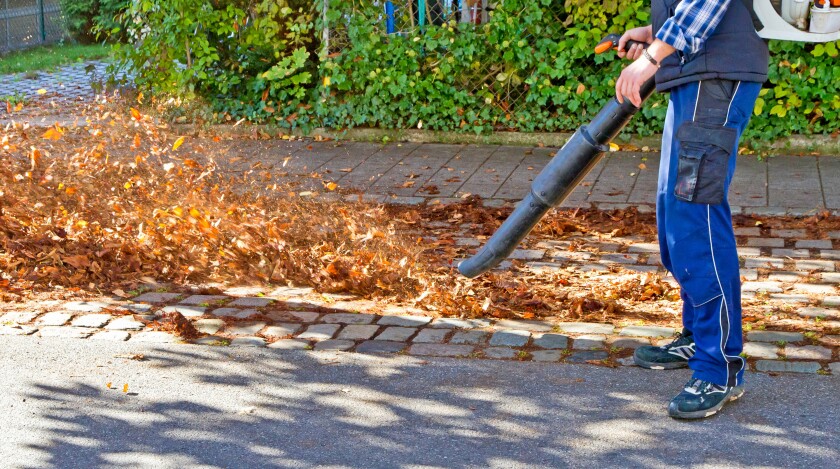After years of complaints being blown around about gas-powered leaf blowers, representatives of several local groups have begun meeting to explore forming a coalition to combat the noise and environmental effects.
About 14 people, including members of several organizations along with other residents, participated in a May 7 Zoom meeting. Many expressed support for forming a coalition to promote a ban on gas-powered blowers, while others were hesitant, citing concerns about economic equity.
One of the meeting’s hosts, La Jolla resident Patty Kushner, told the La Jolla Light that gas-powered leaf blowers are “an overall disaster,” creating high levels of air pollution with their exhaust, which is unhealthy for those who use them and those around them.
The blowers also pose hearing risks for users, Kushner said. According to the Centers for Disease Control and Prevention, noise from leaf blowers is above the recommended safe decibel level of 70 and can cause hearing damage after two hours of use.
Beyond the health risks, the noise is a form of pollution on its own, disrupting neighborhood quiet, Kushner said. “A lot of people are working from home, they have Zoom meetings and it’s impossible to have them because there’s noise all over.”
Area cities such as Coronado, Del Mar and Encinitas have banned the use of leaf blowers, and Kushner and others would like to see a similar ban in San Diego.
One of the obstacles to implementing a ban is concern for equity, Kushner said. “We can’t tell gardeners, ‘From now on, you have to buy this expensive equipment with batteries and you’re no longer able to operate your gas-powered leaf blower.’”
Brian Elliott, policy advisor for San Diego City Councilman Joe LaCava, whose District 1 includes La Jolla, said at the meeting that talk of equity is a “valuable next step” in the discussion and that starting a dialogue with “the perceived opposition” will be “influential as the council considers how to bring” a possible leaf blower ban forward.
Ruth Sandven, chairwoman of the sustainability and environmental action committee for the League of Women Voters of San Diego, said “one of the things that has helped leaf blower bans be successful in some communities is a buy-back program or a rebate program for the smaller … commercial users.” She asked Elliott about city resources to fund such a program.
“That’s a hard ask right now,” Elliott said, citing budget problems that will make Sandven’s suggestion “difficult.”
“Where I think there’s opportunity,” he said, “is looking at potential public-private partnerships and exploring … how you can incentivize the transition from gas to electric.”
Carla Ruiz-Velasco, a volunteer with SanDiego350, an organization aimed at preventing the impacts of climate change and climate injustice, said a trade-in program would address equity concerns, as well as enforcement and environmental pieces, since gas-powered blowers would no longer be circulating.
She added that training and education programs would be important to the success of a proposed ban.
Elliott said he liked “that direction” but reiterated concerns about funding. He also asked: “How do you get the word out on that? How do you make sure that the folks who need that program the most have the access to it?”
Michelle De Nicola, co-chair of the zero-waste committee of the Sierra Club’s San Diego chapter, agreed that education is important, especially for property owners who require gardeners to use leaf blowers.
She said a ban would need to incorporate a program to help people transition from gas to electric. “We don’t want to affect anybody’s livelihood if they’re a gardener or landscaper,” she said.

Banning gas-powered leaf blowers while helping small commercial users make the transition to electric was discussed at a May 7 Zoom meeting featuring representatives of several local organizations.
(Dreamstime / TNS)
Peter Andersen, past chairman of the Sierra Club San Diego chapter and current vice chairman of its conservation committee, helped institute a partial ban on leaf blowers at San Diego State University 12 years ago. He said the “equity part is central,” noting that his committee drafted a sample ordinance that includes programs such as buy-back or trade-in.
Andersen said he’d like to look into a “collaborative arrangement between our city and the state of California to get a subsidy” to defray the cost of such programs.
Myles Pomeroy, director of public policy for the League of Women Voters of San Diego, said funding for trade-in and training programs might come from a combination of state money and local foundation grants.
San Diegan Brian Gotta suggested companies that manufacture battery-powered leaf blowers, which would benefit from a ban on gas-powered blowers, might be asked to help defray the cost of a trade-in program.
La Jollan Carolyn Marsden, a member of Ban Leaf Blowers San Diego — which has collected more than 1,400 signatures on an online petition — asked Elliott if a ban on leaf blowers could start with those used on city property. Elliott replied, “I personally love the idea of the city leading by example.”
Ruiz-Velasco said starting with the city and then moving to schools and hotels before implementing a ban in “communities of concern” might also address the equity issue.
Ruiz-Velasco and Michelle Opie, representing Surfrider Foundation San Diego County, said they needed more time to see whether their organizations would agree to join a coalition supporting a blower ban.
Though a coalition was not formalized, Elliott said “the fact that all these organizations are on the same call is really promising.”
The group agreed to meet again on Zoom at 1 p.m. Friday, May 21. For more information, email pkushner@san.rr.com. ◆
"local" - Google News
May 08, 2021 at 10:00PM
https://ift.tt/2RwicFX
Local groups meet to discuss the possibility of blowing away gas-powered leaf blowers - La Jolla Light
"local" - Google News
https://ift.tt/2WoMCc3
https://ift.tt/2KVQLik
Bagikan Berita Ini














0 Response to "Local groups meet to discuss the possibility of blowing away gas-powered leaf blowers - La Jolla Light"
Post a Comment